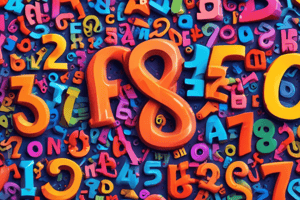Podcast
Questions and Answers
What is the smallest counting number?
What is the smallest counting number?
- 2
- 0
- -1
- 1 (correct)
What is a characteristic of counting numbers?
What is a characteristic of counting numbers?
- They are always positive (correct)
- They are always negative
- They can be fractions
- They can be decimals
What can counting numbers be used for?
What can counting numbers be used for?
- Measuring time
- Measuring length
- Measuring weight
- Counting objects (correct)
What operation is not possible with counting numbers in the classical sense?
What operation is not possible with counting numbers in the classical sense?
What is an example of a field where counting numbers are essential?
What is an example of a field where counting numbers are essential?
What is a representation of counting numbers?
What is a representation of counting numbers?
Flashcards are hidden until you start studying
Study Notes
Definition of Counting Numbers
- Counting numbers, also known as positive integers, are whole numbers starting from 1 and going upwards indefinitely
- They are used to count and quantify objects, people, or things
Characteristics of Counting Numbers
- They are always positive (greater than zero)
- They have no decimal points or fractions
- They can be represented on a number line
Examples of Counting Numbers
- 1, 2, 3, 4, 5, ...
- These numbers can be used to count objects, such as:
- The number of students in a classroom
- The number of books on a shelf
- The number of days in a week
Operations with Counting Numbers
- Counting numbers can be added and multiplied, but not divided or subtracted in the classical sense
- Examples:
- 2 + 3 = 5
- 4 × 5 = 20
Importance of Counting Numbers
- Counting numbers are the foundation of mathematics and are used in everyday life
- They are essential in various fields, such as science, engineering, economics, and finance
Definition and Characteristics of Counting Numbers
- Counting numbers are whole numbers starting from 1 and going upwards indefinitely, also known as positive integers
- Used to count and quantify objects, people, or things
- Always positive (greater than zero)
- Have no decimal points or fractions
- Can be represented on a number line
Examples and Applications
- 1, 2, 3, 4, 5,... can be used to count objects, such as:
- Number of students in a classroom
- Number of books on a shelf
- Number of days in a week
Operations with Counting Numbers
- Can be added and multiplied, but not divided or subtracted in the classical sense
- Examples:
- 2 + 3 = 5
- 4 × 5 = 20
Importance of Counting Numbers
- Foundation of mathematics
- Essential in various fields, such as:
- Science
- Engineering
- Economics
- Finance
- Used in everyday life
Studying That Suits You
Use AI to generate personalized quizzes and flashcards to suit your learning preferences.




